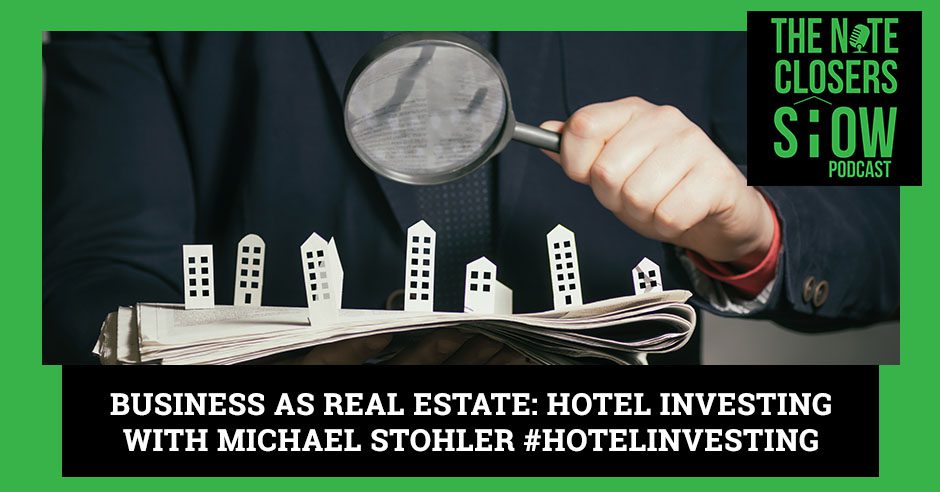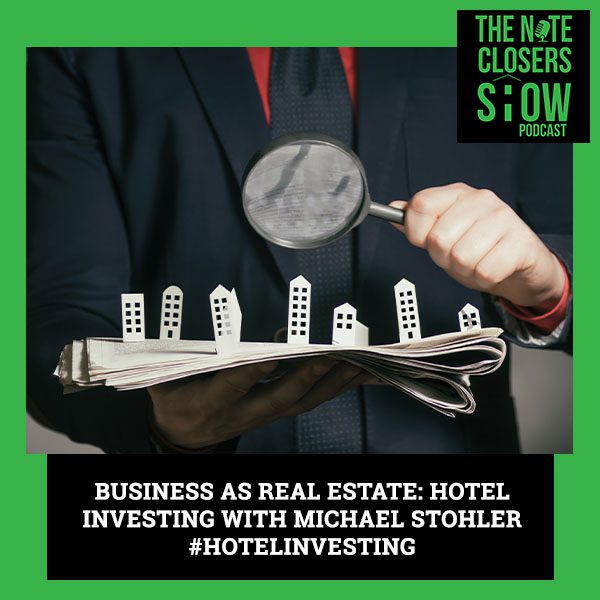
What does hotel investing look like? One of the big differences between multi-family and hotels is hotels is a business and no longer real estate. It sits on real estate, but you’re buying a business. On this episode of the Note Closers Show Podcast, Scott Carson interviews real estate investor Michael Stohler about his love of investing in hotel deals. He then shares the difference between the multifamily and hotel spaces. Hotels are one of the most distressed asset classes out there, but there’s a great chance to succeed in that space if you know how to look at the P&Ls and identify opportunities. Join in and learn if this is something you want to lay your hands on!
—
Watch the episode here
Listen to the podcast here
Business As Real Estate: Hotel Investing With Michael Stohler #hotelinvesting
I’m excited about this episode because we’ve got a very special guest who’s a rockstar. He’s made some transitions and pivots in his life. He’s somebody who is tapping into one of the most distressed asset classes out there. First and foremost, this guy served in our military. He’s a previous commercial airline pilot and a Navy veteran.
He’s a Co-Founder of Gateway Private Equity Group. It’s a real estate investment firm that focuses on hotels and multifamily residential properties. Between apartment complexes, Mike has owned and operated over 1,400 units. He’s always thinking about valued opportunities, but Mike pivoted primarily from the multifamily to hotels and now focuses exclusively on this niche.
We have not had a hotel expert on here to talk about this. We’ve had a few people supposed to be on, but they had to be rescheduled. We’re honored for him taking the time. We got to give him a little bit of break too. This is his third show in a row. When you’ve been booked on that stuff, you might be a little scratchy. Mike, first and foremost, thank you for your service and thank you for being on the show.
Thanks a lot, Scott. I’m happy to be here.
First of all, you’ve been investing for years. Were you investing when you were in the service or when you get out of the service? How did that transition to being an investor start?
After I got out of the service, I realized that I’m not a 9:00 to 5:00 guy. I don’t have the mental aptitude to sit in a cubicle. I did it for a little bit and got mad. I was like, “No, this is not the type of farming I want to do, which is cube farming. It’s like, “What do you want to do?” Like everyone or most of the people out there, I picked up the Rich Dad, Poor Dad. That’s the starting book for real estate 101. I liked it and it changed my life.
When I got started, this was what I call the PG days, pre-Google. There weren’t a lot of opportunities out there to learn. The buying part was easy. We went out and bought eight units and failed miserably because it’s not like I could Google how to be a landlord. We lost everything because it’s like, “Now what?” I don’t know how to fix things. I don’t know how to put an ad in the paper for tenants. This is how far back it was. For paperwork, I did know how to do that part but failed. I gave up for a little bit, but then I was like, “I know this is it.”
I was like, “How can I learn?” I went and worked for a property management group. I was like, “Now, I can learn how to be a landlord.” I can manage some units and learn. Find out what kind of paperwork they’re doing, how to evict, how to find people, and all that stuff. I took a break and became an airline pilot because that was what I was shooting for. It was my dream and I did that for a while. Now, I’m making money, and so then I got back into it.
I could use my own money instead of racking up credit card debt in order to do transactions and things like that. That’s how it started. It was that thought process of, “I know it’s the right thing to do. I know that real estate is it.” You look back in the history of mankind who are the movers or shakers. I don’t have the brand of an Elon Musk and those things. You got to do it some other way. It doesn’t take a lot of brains to make it in real estate. You have to know what you’re doing and have the right mentors or the right coaching.
That’s true. Who was one of your biggest coaches once you started getting back on the right track after you licked your wounds? As investors, we started off thinking, “We can figure this out. We’ll do it as entrepreneurs.” It’s like, “Let’s jump out of the plane and we’ll build a parachute on the way down.”
How is that going to work out? You’re going to fail miserably like me, but that’s a great question. The people at the property management group and my boss at the time pushed me. He goes, “This is how you do it.” He invested and taught me all the things that he did and he had some homes. Fast forward, I had a coach that talked about, “This is how you use other people’s money.” I was like,
“I don’t have to buy a fourplex for three years, save up the money, and then flip it.” I was thinking that I could maybe get a couple of hundred units in twenty years. It’s going to take a long time.
You used your VA loan.
That person brought it on and it wasn’t just syndication. It was a joint venture. All these different, unique and out-of-the-box ways of getting deals done. Once I started doing that and I started getting bigger, mentorship and coaching are it. If you want to succeed, you have to be a good student and learn. I did a couple of different coaching programs.
One is focused on the business side and one is focused on the mental side of it, which is the most important one and finding my unique abilities and what I’m good at, and putting down your day into a calendar. It’s all these different mental aspects. Once you get out of the 9:00 to 5:00 job and you’re on your own, now what do you do? That time management part is extremely important. Before this, you would sit there and get on social media. It’s like, “Crap. It’s been two hours.” You have to be disciplined. The mental coach helped me with that discipline on how to be a successful entrepreneur.
That makes a lot of sense there. You’re working for a property management company. How long did you do that before you started going out and buying stuff on your own?
It was a while. I worked for that property management group for a couple of years. I then became that airline pilot. I finished college, G.I. Bill. I was working for the property management group and going to class at night. Later on, I became an airline pilot. Several years later, I was like, “I’m over the pain of losing everything. I know this is it and this is the life I want.” That’s when we bought a fourplex and hired a property management group while I was still flying. That was the start of the ramp-up.
What happened is I got injured flying into Houston, a bad injury, I tore my forearm trying to land the airplane. While I was on disability, I realized that the property management group was nickel and diming me. I was like, “No wonder this thing isn’t making me money.” I fired him and started doing it myself using that. It was like, “I’m not going to make those same mistakes that I did. I now have the knowledge from someone that owns tens of thousands of units.” That was it. I talked to my wife and I said, “I can do this,” because I was turning that little complex around, and the rest is history.
You bought a lot of units. When did you discover hotels or what made that switch or evolution?
The cap rates were starting to compress in the multifamily sector. I was getting to the point where I sold that complex a year ago and now it’s twice as much. I’m like, “It’s a pig.” I toured it and they put laminate down and painted the outside. I’m like, “Really?” That’s when I was thinking that it was getting saturated. I had this group out of Idaho or Iowa. They came down and looked at a couple of my properties that weren’t even on sale. They said, “I want to offer you this amount.” I turned them down three times. On the fourth one, they looked at this one property and said, “This is it. This is the final thing. Here’s how much we’ll pay for it.” I’m going, “That’s the most stupid number I’ve ever heard in my entire life.”

Hotel Investing: It doesn’t take a lot of brains to make it in real estate. You just have to know what you’re doing and have the right mentors and coaching.
I was like, “What in the world is going on with this market in multifamily?” I was a fool not to take it. I made almost $900,000 on that property in ten months. I’m like, “Now what am I going to do?” I was going to 1031 it. That’s when I was like, “I’m not going to speculate.” At that moment, multifamily became speculation, “Am I going to buy something at 3.5 hoping it goes to 3?” What happens if you have inflation now? What happens when that interest rate starts going above the cap rate? I was like, “I don’t like speculation.”
Everything is about networking in this industry. I knew a guy that had a lot of years of experience in hotels and I started talking to him about it. If you do cap rate conversions, we don’t use them but they’re 8%, 10% and up. It’s because HGTV doesn’t have the hotel episode yet. No one is thinking about it. My brother is not doing hotels. Everyone’s goal when they start with the fix and flip is eventually going to multifamily. There are millions of people and syndication that are doing multifamily. It’s saturated. God bless them, it’s still going up. At what point are we going to make that shift? It’s not there for hotels. As matter of fact, it’s going the other way because of COVID and things like that.
What I did is I talked to the guy and I said, “I’m going to make you a deal,” because I had all the different coaching. “You’re going to teach me everything you know about hotels and you’re going to run the operations for me. You’re going to find the hotel. I’ll give you a piece of the action if you do this.” There we go. Long story short, that’s how I got into hotels because I didn’t want to buy multifamily at that rate.
It makes sense. We see it all the time. It’s the same thing as, “How are you buying that at such a low cap rate?” People are raising capital. They’ve got to buy something because there’s money burning a hole in their pocket. Years ago, when everybody in California would slice your grandmother’s throat for a 4 cap, now they’ll do it for 2 cap. It’s inflation rising.
I look back at trends. When I first got into the note space back in 2007 and 2008, we were buying a lot of apartment notes that people had overpaid for. Some of these big gurus who were on stage overpaid because they had money that they had raised. They ended up having to take a loss and walk away from the deal, and we picked it up at a big discount. We see that happen again at some point down the road. As you said, hotels now are very distressed. When did you buy your first hotel?
It wasn’t that long ago. It was 2017.
We don’t usually use cap rates but as far as investors, we like to convert things to cap rates. What are some of the metrics? What are the things that you’re looking at when you’re evaluating a hotel?
If we have had this conversation in 2019, it had been completely different. Something that we did during COVID is instead of crying and drinking our way through COVID, we listened, paid attention and looked at the reports. There’s a lot of great industry reporting and analytics in the hotel space. We can break everything down by each hotel class, each region, each different city, each neighbor, and each area of town. We can pay attention to that. One of the big differences between multifamily and hotels is hotel is a business. That is what people have to understand. It is no longer real estate. It sits on real estate but you’re buying a business. You have to look at it that way. That’s why we don’t use cap rates because we don’t look at the NOI.
It varies so much across the board.
It varies. We look at gross. What is it gross right now? When you buy a business, whether it’s manufacturing or industry or anything, in each type of business, there’s a generality that it’s worth X amount times gross. You buy one business and a good variable is worth two times its gross. That’s what you offer. With hotels, it could be 4, 4.5 or 5 times gross.
We look at that gross and then how can we get that gross-up through putting our own people, by not using property management, by using our own management, by looking at the vendors, and all these different things. What we do now, whether we’re doing a ground-up or buying something, is we look at the different drivers. Why are people driving to that hotel? What drives them to that hotel? Pre-COVID, you can’t go wrong if you buy a hotel near a university.
It’s the same thing with weekend Airbnbs around a university with a football or basketball team, and that stuff.
Until COVID happens, no one is going to school and no one’s visiting the kids that are going to school. We look at the different drivers and what hotels did the best. For multifamily people, you know what a C-plus and B-minus are. Those are the type of things that we like to stay in as far as hotels. It’s blue-collar. It’s not your high-end. They don’t have the restaurants and conference space, but they have free breakfast and free Wi-Fi, and they’re gone. It’s more of a transient hotel. We look now at the ones that did well, outside of a major metro, off of a highway, a major artery, and it has truck driver parking. Who kept America rolling during COVID?
This out-of-the-way old hotel is nice and did the best in our portfolio. I can’t believe it. It was in a smaller town. That’s another thing during COVID, nobody wanted to go into the major metros. They didn’t want to be around five million people that might have COVID. A comfort inn is a comfort inn whether you go into that city or you stay twenty minutes South or North or wherever. You can save a little bit on the rate but it feels better.
It’s that placebo effect. It’s only a town of 25,000 and it’s off the highway. We get breakfast and free internet and then go the next day. Those are the type of things that people can afford. Truck drivers, the family of three, and the traveling nurses that were there. It’s that blue-collar $80 to $120 a night instead of the $300 or $400. They also don’t want the $50 to $60 a night hotels. They don’t want to sleep with any bugs. That changed our way. It’s like, “We’re going to bring blue-collar hotel people.”
Are you seeing a lot of those? Do they have a flag like a comfort inn or non-flagged hotels? Are you seeing the lower value aspect of hotels or are you seeing some stuff?
We like flags. It’s all about when you have a flag hotel and depending on which flag. I have now attached myself to a company that has 90 million followers as far as rewards programs. I don’t have to do any marketing. I don’t have to do my own website and reservation system. I can plug and play into someone that everyone knows. They want that rewards program, and they’re going to go to Marriott.com or Radisson.com, enter the city and we pop up. That’s why we do flag. It will be one of our builds that we’re going to do in the next twelve months. The only time that we would do a non-flag is if we do a boutique.
I don’t want Mike’s family competing with all the other flags. That doesn’t work. If you do a higher-end boutique in a setting that has multiple drivers, what you can do is attach yourself to a flag, but not have to deal with all of their rules and regulations on how it looks. If I build something in Northern Arizona, and let’s say I want that Southwest or mountain feel, I can do that. Make sure it’s high-end. It’s going to be a small, maybe 50-room hotel. If I want a reservation system, I can attach it to like a Marriott and become what’s called an autograph collection, which is high-end. I only pay them for the bookings they give me, but I’m using their 100 million-plus people.
It’s their marketing machine that you’re tapping into.
I’m just tapping into their machine.

Hotel Investing: One of the big differences between multifamily and hotels is hotels is a business and no longer real estate. It sits on real estate, but you’re buying a business.
Hotels are still one of the most distressed asset classes. I’ve got some friends that own and operate several hotels here in Austin, which is one of the hotter markets in the country. They’re still at 50% of what they were pre-COVID and they are a flag hotel. Also, from the different things that we see on the distressed debt side of things, we see a lot of hotels that come to us where that is still the underlying factor.
Rack rates are down low. When you look at your portfolio, the ones that you have that were good, what were some of the things that you maybe did to the other hotels? Did you reach out to any of the cities? Some of our friends have been doing that. They reached out to see temporary COVID housing or looked at lower-valued hotels or a lower-brand and turned it into transitional housing in some cases.
We did a couple of things. We did what’s called day-use. What that means is there are a lot of business people, men and women that were used to going into their office. Now they’re stuck at their dining room table with three kids running around and whatever going on. It’s hard to concentrate on your work and do Zoom calls because everything was virtual. We said, “For $60 a day, come to our hotel. You have a desk, free Wi-Fi, take a shower if you want, free coffee, and you can do whatever you want. You have that sanity again.” We did a lot of those day-use because the other type of day-use things, they were shut down like industrious and the other ones.
That’s exactly what happened to me. I had an office, Executive Suites. They closed the building for three months. That’s the thing. It’s funny, I went and worked in the lobby of my hotel for a couple of days. I didn’t know that more hotels do that. That’s awesome.
We did that. It’s the only time I’ve ever said, “Thank you, California,” but they closed the entire state down. They couldn’t even do outside sports. It was amazing to me. That’s the best thing they ever did for us. If you can imagine this, we would have travel teams that lived 4 miles apart from each other in San Diego. They would get on a bus, travel all the way to Arizona, and stay at our hotel. Those types of travel teams helped us.
We went out and networked with different groups of traveling nurses. The CDC, which is a lot of the trucking and a lot of the commercial tech machines. Those are some of the things we did. To save money, let’s say, it was a 3 or 4-story hotel. We would completely shut off the top floors with no AC, no heat and no lights. We completely shut them off and work as a two-story hotel. We’re doing things like that.
That keeps your costs downs with cleaning and power, but your labor costs as well, I imagine.
It did. The great thing and one of the biggest differences between hotels and multifamilies because we’re a business, we’re considered a small business by the government. We got the EIDL Disaster Loans and PPPs. Even though we were running it with hardly anything occupancy on some of that, I kept the full staff. They appreciated that until now, no one wants to work. That’s a whole other story. During COVID, I took care of them. It was nice that we got a lot of city grants and state grants. I was a grant-finding machine and that helped us. That is what has brought us through COVID.
The ones that did not do well during COVID will still do the best 5 or 7 years from now, the ones that are in the corporate parks. We have some nice beautiful property in a town that is booming with chip manufacturing, and all this type of business and all this stuff coming in. The land itself is going to be worth five times. That’s the long-term. That will appreciate. Those are the ones that struggled because it needs that corporate business.
The foot traffic or the people staying nearby where they’re working. I’ve seen a lot of that stuff there. You mentioned your buildup. You’ve bought existing ones primarily. You’re looking at the operations aspect of it. What are you looking to buy? What kind of multiplier of the operations?
What we do is number one, look at where it’s at. Too many people, especially in the multifamily world, sit there and go, “I have to have 20% or I need a 30% discount.” Who cares if you know that there’s growth? If you look at the five-year plan of the city and you see that three manufacturing plants are coming in, there are permits for 4 or 5 newly built multi-families, and different industries are coming in if there’s stuff happening, why not pay? That’s one of the things. As an out-of-state owner, it’s being mismanaged. If I can go in and look at the P&Ls, I’m like, “Why in the world are they doing this?”
I’m wondering, is the owner paying that much attention to it? I know then that we have something that we’re going to do because we can fit in with our own people and rehire a GM and then work it. That’s similar to multifamily. I looked at the gross and say, “If it’s $1.5 million gross now, how long do we see a performance where we get it to $2 million a year,” because that’s what the hotels are based on. If I can buy it at 4.5 times gross at 1.5, even if it stays at 4.5 and I can bring it to $2 million, investors are happy
How are you raising capital? Is it syndications or put funds together? What’s your financing strategy?
Most of them are syndications. I’ve done some JVs. You have someone that has a lot of money. It’s like, “I want to be the only partner.” That’s fine. That’s less work for me. Syndications, I only do credit investors. I learned the hard way. I don’t want you to ask me for your money back six months from now. I’m not going to do them. I don’t want to put up with that. I look at people that know the ins and outs of real estate investing. I would love it if they’ve done it before. A lot of my investors syndicated multifamily and they’re diversifying. They’ve done some rentals or owned some things, and they’re looking to diversify. They’re not putting their whole nut in with us.
It takes a lot of pressure off of me. You can imagine during COVID and it’s like, “Sorry people, we’re not going to have any distributions,” because the survival of the asset is the most important thing. You need the investors to understand that. You’re not losing money. It all rolls in. You’re still going to have it and make 2.3, 2.5 times your money, but you have to understand why and what we’re doing to protect the asset.
It makes a lot of sense there because that’s the most important thing. When you start dealing with lower-level investors, it is often their full nut. If something goes awry in their personal lives like we’ve seen happened, layoffs and things like that, “I got to get my money back.” You’re not an investor at that point.
I’ve had some people say, “I want to refinance my house and do HELOC and put it into one of your hotels.” I’m like, “Don’t do that.”
“I got a credit card with 0% interest for six months. Tap it up.”
“Let me cash out my credit card. I want a piece.” I’ll let you stay in the hotel for a discount. How about that?
People do stupid things. They get excited. We’ve seen people come to us like, “We invest in this apartment complex. We overpaid for it. We’re not getting anything. They changed the contract. It’s not a return on principal. It may be a return of principal.” There’s a lot of crazy stuff you got to read out there to make sure they are out there for you.

Hotel Investing: If you know that there’s growth, and when you look at the five-year plan of the city and you see that three manufacturing plants are coming in, there are permits for four or five new build multifamilies, and different industries are coming in, why not pay?
You’ve given some great qualifications there for a hotel. You don’t mind the smaller cities because it may be the only thing there, and a couple of things there that do it. We see that in some small towns in Texas and other places like that. The hotels still do good. As you’ve evolved here now to a fresh start, are you interested in distressed stuff as long as the numbers make sense for you?
There are a couple of things. We’re looking at buying some distressed. Here’s the thing, it’s not really distressed. If you’re familiar with CMBS loans, the hotel owners that had the CMBS loans are the ones that suffered. When you have market-based security as your lender, they don’t have the mechanism to give you four months’ deferment.
You can’t call the stock market and say, “Can I not pay for four months?” Their help came way too late when there was hope. They were never allowed to get a second, so no EIDL. None of that helped. They couldn’t sit there and say, “I have some cash I need to refinance. I like it second.” You can’t do it. You have assets that are coming on and it takes a long time. People thought they would see a lot more now. The whole machine takes a long time for that to happen. You’re seeing those types of assets and they could be performing. They could be great assets.
I’ve seen several in Texas that could work, but they got so far behind. There was no deferment that by the time help came, it’s like, “Now that it has been a year and a half, we’ll give you two months off.” “How about the six months that I haven’t paid?” Those are the things and the auctions that are going to be coming on. There are opportunities for you to look at the notes and go to the lender to say, “We’ll bring them current and take it over.” When you have that type of asset, they’re not that bad. They’re not something you need to put millions of dollars into it. They’re not that distressed. They just got behind because of a bad situation.
They need someone to come in that understands that. Maybe they buy the debt at a discount so it gives them some flexibility to allow the borrower to start back over. If they get back on track, it’s a pretty good cap rate. You can take over the asset and start managing yourself, and go from there.
It’s a fresh start. Now that debt has been paid off. You need someone with the capital to come in and say, “You’re behind $150,000 or $200,000. Here it is. The banks are happy. They do the credit. “You have five hotels. You know what you’re doing. Here you go.” You can get the asset for not very much money.
That’s the beautiful thing in some banks out there. I won’t say the CMBS, but we see a lot of your local bank that finances about 60% of the commercial stuff that’s below $5 million assets. They’re flexible on that. If somebody is coming in and has management experience, they may even carry that financing with a much more down payment. “It’s okay. You’re in the management bring, 20% of the table and we’ll carry the rest for you.” You move it from the non-performing side to the performing side of the bank.
Especially if it’s a smaller community bank. In 2017, 2018 and 2019, you had these smaller community banks that wanted to get a foothold. They were giving restaurant and hotel loans, and then they’re like, “We’re not big enough to absorb 3, 4, 5 of these $5 million hotels. What can I do?” We become the savior.
What’s your long-term goal? Do you have an idea of how many doors you want to own or what the next step is for you?
The next step is we’re getting ready within the next several months. It looks like we’re going to be building ground-up three hotels. We may look at some distress stuff if it makes sense and if it meets those different criteria. I’m not going to buy something if it’s a great deal and I know there is just one driver. It may be a good deal on paper, but then the stress that I’m going to have is too much.
The reason why we like ground up right now is the automation. I know the building costs are up but you’re building and it’s over a two-year period. You’re amortizing that building period, but then you have a brand-new box and you can have more. If you look at some of the distressed in that same market, the $2 million or so that you have to put into it to get it into the next-gen for what that flag wants, now you’re up at that area, and then you’re like, “Now, what is going to go wrong with it?”
Some of the new concepts are nice. Because the flags are wanting to expand, they’re willing to give us maybe $5,000 or $6,000 discount a door to build and maybe defer franchise. There are a lot of things going on because they’re wanting to expand, but automation is a big thing. You can have a hotel where there’s no front desk if you want. You can do a lot of things like that. That appeals to me, especially now because of the employment situation. There’s a reason why there are kiosks at McDonald’s and there are self-checkouts at the grocery stores.
I’ve seen that with Marriott. They are doing that where you check in with your phone, your phone is your key, and stuff like that, especially during COVID. They had room service and stuff like that, but I don’t need to go by the front desk. I went straight to my room at night. I didn’t even talk to anybody. I checked out and everything was very automated. That’s the thing, especially with the cost going up for labor, having hard to find people that want to work, especially graveyard shifts and stuff like that.
They even have robots coming up and bringing you towels now. You can do anything you want.
The towel robot. That’s nice.
It’s crazy what you can do. That’s the future of hospitality. If you can have one person working instead of several, you won’t believe how much money they can save you in the long run.
I don’t doubt it for a second. Mike, I have to ask a question. Do you teach this stuff? Do you offer classes? What stuff is there for helping?
I don’t have anything set in stone. I’m too busy, but there are people on the side that will say, “How much for you to sit or Zoom with me once a week?” I have someone that I’ve met on LinkedIn. He’s like, “Can I pay you to look at this deal?” I’m like, “Okay. I’ll do that,” but it’s still their decision. You have to have those things. I’m not going to tell you to buy it. If you screw it up, you’re not going to come to me. Things like that.
It’s buyer beware in commercial stuff.
If you look at goals, our goal is probably a dozen hotels in our portfolio. We want to get there, and then we’re flipping some and selling some every seven years. The great thing about this business is you don’t have to retire. You have to then hire people that take the workload off of you. My main partner and I, we are wanting to get into coaching. We see a big need for those people that want to make the transition from multifamily to hotels. We are working on getting that course down and what it’s going to look like. That’s another thing that load on us, but we’ll eventually get there maybe soon. The acquisitions right now are number one.

Hotel Investing: The great thing about this business is you don’t have to retire. You just have to then hire people to take the workload off of you.
Are you seeing any opportunities on some of the lower-valued or some of the shut hotels to turn those either back into operating or converting them into multifamily?
There are a couple of things that I’m seeing now. It’s a lot better if you can find an older extended stay because they’ll have a kitchenette and a lot of those types of things. We’re seeing a lot of assisted living. The Baby Boomers are getting older and there are a lot of them. What is nice is you can own that land and property, and then have an assisted living company come in. They’re leasing that space from you. It’s a lot higher rent on the daily race of the ADR. We’re seeing that a lot, especially if it’s near a hospital. We’re seeing that.
I saw an article that made me think about that. A guy who didn’t have a lot of money in retirement, but he’s living in Holiday Inns across the country for $40 a day. He’s like, “I got a gym, hot food, a little happy hour, and a pool so the grandkids can go. I can travel.”
You have to be careful that they don’t stay more than 28 days in a row because then they become tenants. They then have to evict them from the hotel.
That will all vary in the city and the state. That’s never a good thing. You don’t want towels delivered to them at that point. Mike, I see the guitars hanging in the background. Do you play a little bit?
A little bit. Something that you always need is downtime for stress relief. I like to workout in the morning to get my day going the right way. A night to forget about all the fires and all the stuff, I put on the headsets and wind down and play some guitar. It’s so important to not overwork yourself. You need that downtime.
Amen to that. Who are your top two guitar players that you’re a fan of? I know there are many out there.
I love Slash. I have a custom Les Paul that’s one of the ones that Slash plays.
What year is that?
That’s brand-new. It’s a custom Slash. Slash makes his own custom Les Paul. That is his special pickups, humbuckers, his own type of strings, and his own type of tuning. I can’t play like him.
We can all dream and act like it.
I play a lot of AC/DC and things like that. I love Angus.
We came across the Kiss Cruise that they’ve had for years. Have you heard of that?
No.
There’s a cruise that Kiss puts on most years where it’s all Kiss fans and the whole Kiss fans. Everybody comes out and makeup. They have a jam session. The guitar was a part of it. They didn’t have this during COVID. We’ve got a friend who has been on it for ten years in a row. They jam out. It’s four days with everybody from the band.
That would be very cool.
Mike, thank you for jamming with us. The best way for folks to get ahold of you or reach out to you, LinkedIn or a website. What do you prefer?
My LinkedIn is Michael Stohler and the website is GatewayPE.com.
Thank you so much for coming to the show. I look forward to talking more with you. Rest your voice now for the next round of stuff.
Thank you.
—
You read it here. This is something you’re going to take a look at as you’re reaching out to banks and asset managers. Mike shared some great nuggets to look for when you’re thinking about diving or looking into it. It’s worth checking out. It’s an asset class that we got. We see a lot of distressed out there, but a lot of opportunities if you know how to step in and operate that, or how to look at the P&Ls and identify opportunities. Go out there. Take some action, everybody. We’ll see you all at the top.
Important Links
- Gateway Private Equity Group
- Rich Dad, Poor Dad
- Marriott.com
- Radisson.com
- Michael Stohler – Linkedin
About Michael Stohler
 I’m a Navy Veteran and former airline pilot. I see real estate partnerships as an excellent way to build wealth.
I’m a Navy Veteran and former airline pilot. I see real estate partnerships as an excellent way to build wealth.
➡Passive investors: get access to our next hotel deal: www.GatewayPE.com/invest
➡Active investors: learn more about adding hotels to your portfolio: TheRicherGeek.com/workshop
➡Other Resources:
|| Check out our podcast: https://www.therichergeek.com/
|| Learn more about our story on the BiggerPockets Podcast:
From Rookie Mistakes to Syndicating BIG Deals with Nichole Stohler
|| Follow my hashtag #hotelinvestor to see all of my educational and entertaining content about hotel investing!
Cheers!

